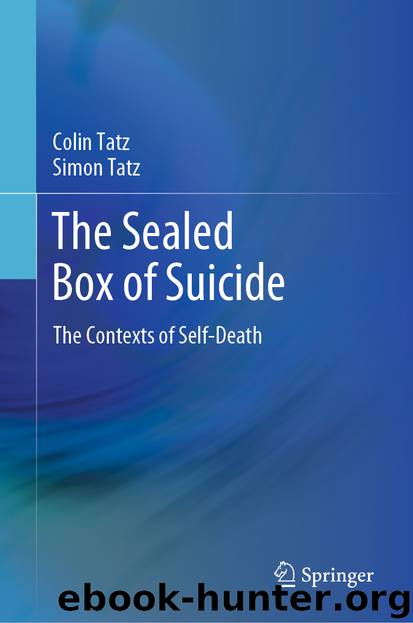The Sealed Box of Suicide by Colin Tatz & Simon Tatz

Author:Colin Tatz & Simon Tatz
Language: eng
Format: epub
ISBN: 9783030281595
Publisher: Springer International Publishing
8.2 Prevention is not a Science
In health, prevention means intervening before adverse effects set in. Routine immunisation, screenings and scans are integral to preventive health. ‘Intervention ’ is to intercede in, to modify, even avert, an outcome. Medical evaluations are used to determine outcome criteria, assessing the effectiveness and value of a treatment. As discussed earlier, suicide is locked into the biomedical environment, guarded and guided by the helping professions. Evaluating preventions and interventions (we use the term preventions from here on) should, at least in theory, use similar tools of measurement. But suicide isn’t cancer showing on a scan; it isn’t a blood disorder or a genetic abnormality amenable to examination or verification.
How will the medical world (rather than the realm of the psychology and social work preventionists ) view current suicide prevention practices a century hence? Will ‘preventionists ’ abjure the overuse of antidepressants , the reliance on helplines, websites, apps and Facebook sites, and the millions expended on awareness-raising campaigns? Will they wonder why we were using approaches first initiated in 1906? Two centuries after the Save-A-Life League opened its doors, will we still be ignoring the social contexts of diverse forms of self-destruction?
We see much of preventionism as a way of forestalling blame, avoiding ‘failure’ to stop an ‘epidemic’. Rarely questioned is the very notion of whether suicide can be prevented: the premise is that it can be and therefore it must be. Like other aspects of medicine, degrees of faith are required. Medical science has limits; the public accept that we cannot explain why some treatments work and others don’t, that some diseases are incurable. Modern anaesthesia dates from 1842, and yet we don’t fully understand the mechanisms by which it works. Today, the medical profession is grappling with cannabis and whether there is sufficient ‘evidence’ as opposed to ‘observation’ to prove its efficacy as a front-line treatment for seizures, and the like. Scientific verification and evaluation create an accountability that we hope, or assume, accompany a product to the market place. There are, of course, infamous exceptions, as with Prozac , discussed earlier.
Suicide prevention strategies have limits. In the absence of scientific protocols and clinical trials evaluating outcome criteria, an element of belief underpins the process. If suicide is a disease or disorder, if indeed there is a definable ‘suicide’ gene, then the preventions adopted should be open to evaluation , a matter discussed in the next chapter. A disconnect exists in prevention : while mental health professionals see suicide within medical parameters, prevention analyses are shapeless and fuzzy. Many strategies are not evaluated and those that are rarely publish the results of a review . Their focus is on outputs, not outcomes; which is why measuring the extent and recognition of awareness-raising material, counting the ‘hits’ on websites and apps, and calls to hotlines, substitutes for evidence. In Australia, more rigorous evaluation (particularly with Aboriginal and Torres Strait Islander suicide projects) is occurring (Jorm et al. 2012; ATSI SP 2017). But in our experience, the Jorm et al.
Download
This site does not store any files on its server. We only index and link to content provided by other sites. Please contact the content providers to delete copyright contents if any and email us, we'll remove relevant links or contents immediately.
Good by S. Walden(3548)
The Social Psychology of Inequality by Unknown(3018)
The Checklist Manifesto by Atul Gawande(2846)
0041152001443424520 .pdf by Unknown(2843)
Get What's Yours for Medicare: Maximize Your Coverage, Minimize Your Costs by Philip Moeller(2632)
The Meaning of the Library by unknow(2564)
Guns, Germs and Steel by Diamond Jared(2365)
Borders by unknow(2303)
23:27 by H. L. Roberts(2248)
And the Band Played On by Randy Shilts(2197)
Being Mortal: Medicine and What Matters in the End by Atul Gawande(2108)
A Leg to Stand On by Oliver Sacks(2033)
The Hot Zone by Richard Preston(2013)
More Than Words (Sweet Lady Kisses) by Helen West(1860)
The Valachi Papers by Peter Maas(1847)
The Laws of Medicine by Siddhartha Mukherjee(1797)
The Andromeda Strain by Michael Crichton(1742)
Get What's Yours for Medicare by Philip Moeller(1682)
The Obesity Epidemic by Robyn Toomath(1673)
